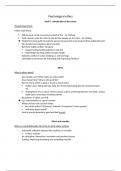Psychological ethics
week 1: introduction of the course
thought experiment
trolley experiment:
1. Pull the lever to kill one person instead of five – do nothing
2. Push a person onto the track to safe the five people on the track – do nothing
People feel more guilty to push the person because feel more involved than pulling the lever.
- We already have intuitions about morality
- But these might conflict? Compare:
Surgeon killing healthy patient to safe five
Psychologist harming subject to gain insight
- Indicates conflict of values (helping vs. not harming)
- Controlled environment for inspecting and improving intuitions
Ethics
What is ethics about?
- how should I act? What makes an action right?
- How should I live? What is the good life?
- But not every action is good or bad in a moral sense;
Trolley cases; heling old lady; lying to a friend; fabricating data for research project
VS
Picking flavor of ice cream; where you put cutlery; preferring Beyonce over Bach; acing a
math exam; choosing a romantic partner
- Boundaries of ethics can shift
E.g. homosexuality vs. age of consent
- Always actions that concern others
But which others? All human? Animals? Ecosystems? Future people?
And what about myself?
- Hard to precise boundary: good and bad as such
Ethics and morality
Ethics or moral philosophy (tip of the ice berg above surface)
- Systematic reflection (beyond the intuitive) on morality
Critical, evaluate
- As a discipline: theoretical, normative and practical science
- Guiding, improving developing and evaluating morality
,Ethos or morality (underneath the surface)
- Ethos = custom, habit
- The guiding ideals, attitudes or habits that characterizes a person or community
- “Gut-feelings” (based on culture, upbringing, religion, gender, etc.) and also biases
Systematic reflection on ethical rules and principles will ultimately become part of our
redefined intuitive sense
Ethical dilemmas
Ethical: about morals (values, norms, principles)
Dilemma: conflicting, contradicting morals
- No easy solution
- Not only one solution
- Downsides to all options
- Is not same as ‘problem’
Three main areas of ethics
Metaethics Normative ethics Applied ethics
- Reflection on ethics itself - Reflection on morality and - Reflection on morality
How should we think moral behavior within a specific discipline,
about ethics? - Seeks to set citeria to area, profession
- Foundations, concepts, separate the morally right - Concerns the practical
assumptions, e.g. what from the morally wrong: application of ethics in a
defines ‘good’? what is the right thing to specific discipline, such as:
- Taking a step back: do? How should I live my Medical ethics
What is the status of life? Psychological ethics
morality? - Classical theories: Bioethics
Are moral standards consequentialism, Animal ethics
relative or absolute? deontology (Kant), virtue Environmental ethics
Are we egoistic or ethics
altruistic by nature? - Contemporary theories:
pragmatic ethics, care
ethics
Metaethics
Challenges to ethics
- We have no free will, so there is no right or wrong
- There is no god, so anything goes
- Morality is just fiction, we are all egotist
- Morality is a lie used to control people
- No action is always right or wrong, so there are no good or bad actions
- What is good differs per individual culture
- We already know what is right intuitively, so we don’t need ethics
, Psychological ethics
Ethics and psychology
- Psychologists work with people, to benefit them (as clients, employees, participants)
- Psychology = “the helping profession”
- Psychologists are faced with ethical questions
Should we intervene in clients’ lives against their will?
Is it morally right for a psychologist to deceive
, Two notorious experiments
The Stanford prison experiment
- Taught us that people are capable of everything in certain situations?
- Tells us something about the power of roles, identity dehumanization and deindividuation
The Milgram experiment
- Taught us that everyone can become a monster?
- Teaches us something about responsibility?
- Teaches us something about authority?
Ethics and psychology
- Controversial experiment have given rise to ethical codes
- Responsibilities of psychologists go beyond treating individual clients and research
participants well
- Psychological insights influence society and ethics (moral psychology)
- Mutual influence
- Neither discipline is static!
Acculturation
Acculturation and ethical environment
Ethical environment
- Ethical environments change over time
- Exploring the ethical basis for a law or rule can be a way to understand the ethical
environment within which the law operates
- “whereas the natural environment dictates what is possible, the ethical environment selects
out the many possibilities those that ought to be and ought not to be done.
Is VS ought: we cannot derive from normative conclusions (ought) from the facts about how things
are. You need more argument.
Culture and acculturation
- What culture am I entering into?
- What is this group?
- Who is this “we”
Acculturation
- Concerns your ability to become connected with the profession of psychology as well as
other professions
Becoming part of the ethical culture of psychology
The system of common beliefs, shared meanings, norms and traditions of the profession




